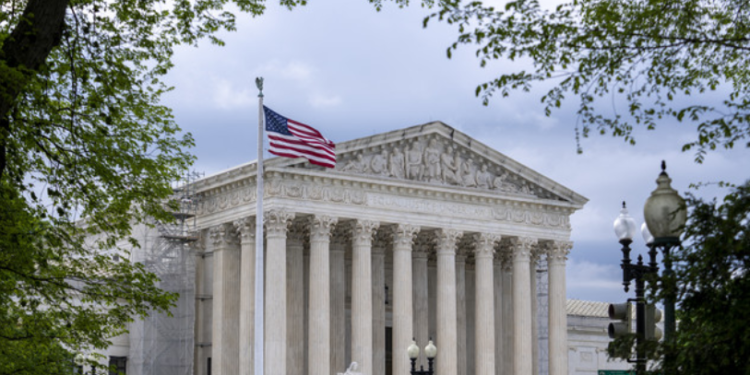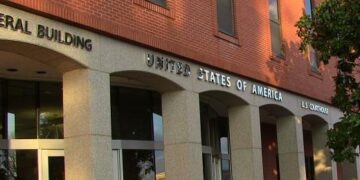The Supreme Court’s order referenced the principle that states and local governments should avoid altering election rules shortly before voting. | J. Scott Applewhite/AP
May 15, 2024 Story by: Editor
On Wednesday, the Supreme Court reinstated a Louisiana congressional voting map that includes an additional majority-Black district, delivering a significant win for African American voters and Democrats ahead of the November election.
The decision followed emergency appeals after a federal three-judge panel struck down the recently redrawn map, ruling it to be an unconstitutional racial gerrymander. This left Louisiana without a valid voting map for the 2024 election, which will influence control of the narrowly divided House of Representatives. The Supreme Court’s ruling brought clarity to the election, a move welcomed by Republican leaders in the state.
Civil and voting rights advocates also hailed the decision. Stuart Naifeh, an attorney with the NAACP Legal Defense Fund who represents Black voters in the case, commented, “It’s the right outcome for Black voters in the state of Louisiana.”
The politics surrounding the decision were notable, with conservative justices supporting the map that includes two Black-majority districts. In contrast, the liberal justices—Sonia Sotomayor, Elena Kagan, and Ketanji Brown Jackson—opposed the decision. Jackson, in a dissent, criticized the court’s intervention as premature, stating that the issue of racial equality in elections is “among the most consequential we face as a democracy.” She argued that the court had sufficient time to resolve the case and determine the correct map for Louisiana.
Historically, courts avoid changing election maps or rules close to an election to prevent voter confusion and to give election officials adequate preparation time. However, the justices have not clearly defined when this principle should apply, exposing differences between the court’s conservative and liberal wings.
Louisiana officials had urged the court for a swift decision, citing the need to finalize the map in time for election preparations. Louisiana Attorney General Liz Murrill expressed gratitude, stating, “We will continue to defend the law and are grateful the Supreme Court granted the stay which will ensure we have a stable election season.”
The ruling only addressed the immediate use of the map for the 2024 election but allowed for appeals to continue. This could eventually determine whether the map with two majority-Black districts remains in place for future elections, such as those in 2026.
Paul Hurd, an attorney representing the voters who challenged the map, remained optimistic that the Supreme Court would ultimately reject it. “The state of Louisiana enacted a brutal racial gerrymander that segregates its voters based on their race,” Hurd said. “Louisiana politicians passed the law at the last minute, lost in court, and then cynically ran out the clock on a replacement map.”
Ashley Shelton, president of the Power Coalition for Equity and Justice, expressed relief, stating, “While we know this case will continue, we are heartened by the fact that injustice won’t be served on Black voters once again in these 2024 elections.”
Louisiana’s redistricting battle stems from the 2020 Census, when Republican legislators redrew the state’s congressional districts to reflect population changes. Their initial plan created only one majority-Black district, despite African American voters making up a third of the electorate. Black voters filed a lawsuit, and a federal court ruled that the map likely violated the Voting Rights Act by diminishing the power of Black voters. As a result, the legislature approved a new map this year, creating a second majority-Black district, favoring Democrats and spanning from Shreveport to Baton Rouge.
Subsequently, a group of “non-African American voters” filed a lawsuit in another federal court, arguing that the new map constituted racial gerrymandering and violated the equal protection clause of the Constitution. A judicial panel agreed and blocked the use of the map. With the election approaching, African American voters and state attorneys urged the Supreme Court to pause the lower court’s decision and allow the map to be used in the 2024 election.
This case is one of many redistricting challenges across Southern states following the 2020 Census. Separately, the Supreme Court is reviewing a South Carolina congressional voting map that allegedly marginalized thousands of Black voters. A ruling on that case is expected by the end of June.
Last year, the Supreme Court stopped Alabama from using a new congressional map that diluted Black voting power. Louisiana’s redistricting case had been on hold pending the Alabama decision, leading Louisiana to use a map in 2022 that had already been ruled as likely violating the Voting Rights Act.
The second majority-Black district, introduced in Louisiana’s new map, poses a threat to the political future of Rep. Garret Graves (R-La.). Among those running in the new district is State Sen. Cleo Fields, a Black Democrat and former congressman. Source: The Washington Post

















